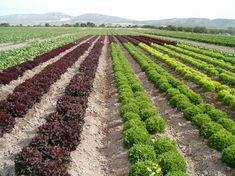
Intercrop, which grows leafy salads in both Spain and the UK, has had to withdraw “tonnes” of continental lettuce types from the supply chain. A piece of glass was discovered by one of its processing customers in a Red Batavia consignment from the Campo de Cartagena area in Spain last Tuesday and a second discovery of a further piece of glass was made the following day in a consignment of wholehead Apollo.
“Our customers picked up the first incident in their raw material inspection,” said Intercrop technical director Thane Goodrich. “It is not unusual to find the odd contaminant such as plastic or twigs, but glass is very rare. The second piece was found in an associated batch from a similar area as a result of the policies and procedures we put into place. It shows the shared advantage of traceability.
“We then took all lettuce varieties out of the chain. You could say it was an over-cautious response as it involved tonnes of raw material, but we were looking at the end consumer and ensuring all product is safe for them to eat.”
There have been no further discoveries in Intercrop’s Spanish supplies and additional teams of inspectors have been introduced at harvest and post harvest since the incidents. Harvesting has now recommenced with the full approval of Intercrop customers and the Spanish authorities have been informed of the incidents. Intercrop is also conducting its own investigations.
There have been similar incidents in the past. Four years ago, one UK supplier had to contend with used razor blades in wholeheads of imported lettuce, although the problem was discovered before the product was marketed.
The knock-on effect of last week’s discoveries is a tightening of supply.
Davis (Louth) Ltd sources from the south of France as well as Spain. “Packers have needed huge volumes and prices have shot up,” said md Peter Davis. “For example, Red Oak has gone from 480p a carton to 520-555p and coarse Frisée from 750p to 1100p. It’s unbelievable.”
Three solid weeks of rainfall in Spain’s salad-growing heartland have not helped. “The sunny weather in the UK has pushed demand up and produced excellent sales and the inclement weather issues mean that if you wanted to time this as poorly as possible you could not have done a better job,” said Goodrich.
Davis said the supply situation is “quite serious. We cannot get anything out of Spain and there are not that many growers in the south of France that are EurepGAP certified,” he said. “The English crop is still three weeks away and Belgium and the Netherlands are only just starting. I would say we have got three weeks of difficulty ahead.”



